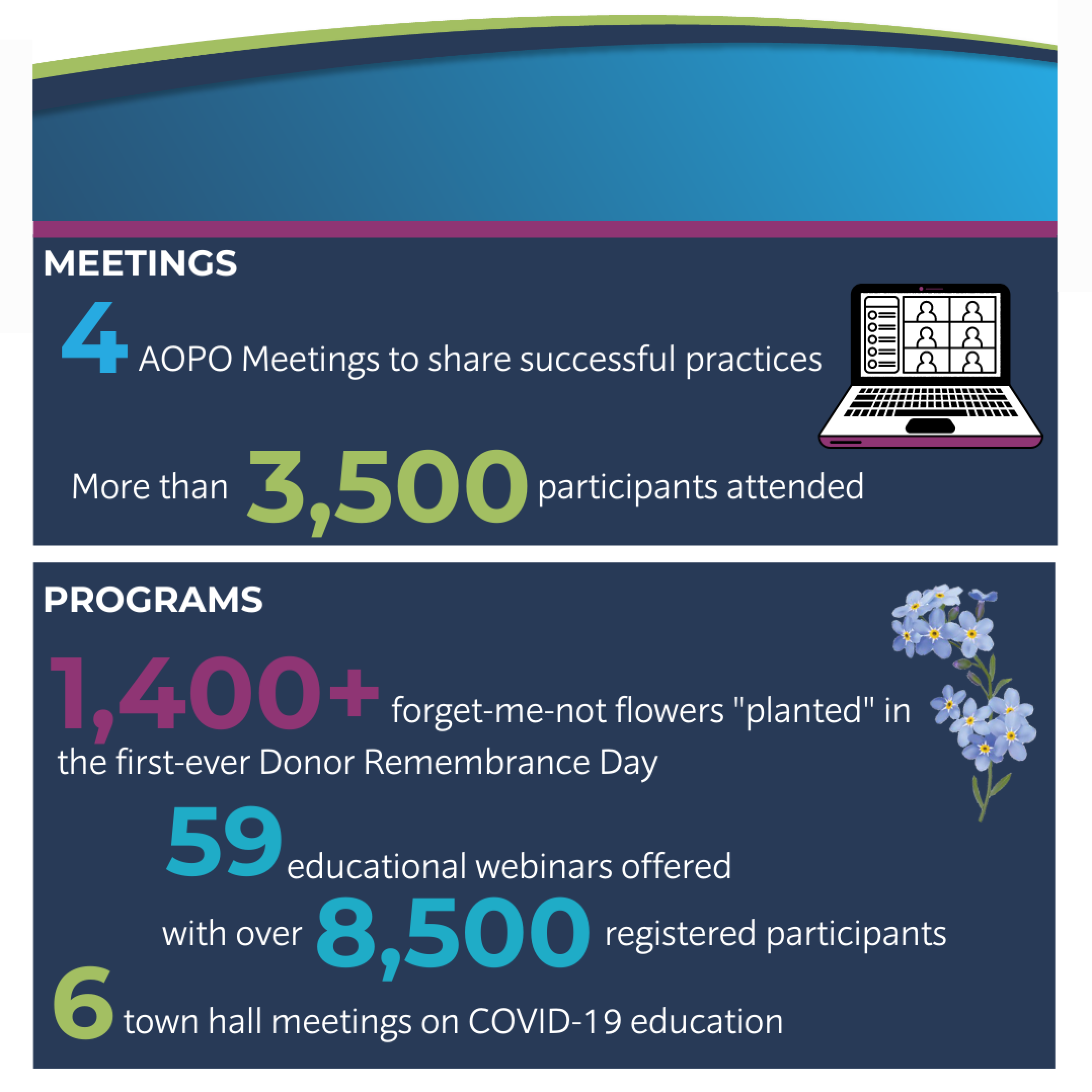Twenty-twenty was filled with uncertainty and change due to a pandemic, yet as an OPO community, we achieved another record-breaking year in donation for the 10th consecutive year. We applaud all of the members of the OPO community who rose to the challenges to ensure the donation and transplantation system continued to save lives.
This has also been a time for change within AOPO. We initiated a new three-year strategic plan to shift our focus to innovation, advocacy, and education. We have been hard at work revamping our advocacy efforts along with adding many communication tools and resources to help advance organ donation and transplantation. The result is AOPO helping to drive continual improvement of the donation process, collaborating with stakeholders, and sharing successful practices.
Communications
We built a new communications program from the ground up, based on research and feedback from OPO members. This included new branding, new and revised digital communications (CEO Update, AOPO Newsletter, AOPO Blog, website, Advocacy Update and webpage, donation process video), and an effective social media strategy. We also incorporated social media and traditional media tracking platforms so we can strategically track our progress.
Advocacy
Advocacy emerged as a very important component of our focus for 2020 and beyond. So much so that we transitioned to a 501(c)(6) organization to carry out more advocacy initiatives as the national voice for OPOs. We also welcomed Mark Cribben to the team as AOPO’s first Director of Government Affairs to help lead us in this important effort to reach out to members of Congress, the executive branch, and policy makers. Our first advocacy campaign engaged over 4,000 individuals who sent over 12,000 emails to Congress, resulting in more than 40 members of Congress supporting AOPO’s position.
AOPO also successfully advocated for guidance from the Department of Health and Human Services for hospitals to ensure OPO staff could access facilities during the pandemic. In addition, we backed passage of the Immunosuppressive Drug Coverage for Kidney Transplant Patients Act.
Programs
AOPO’s program planning team worked double time during 2020 to find ways we could address issues and continue to collaborate despite COVID-19. We hosted six town hall meetings to inform and educate AOPO members during the early stages of the pandemic. In addition, we worked with the American Society of Transplantation (AST) and other stakeholders to host town halls for the broader donation and transplantation community.
We formalized the UNION Data Project that will result in quality OPO performance data to identify and share successful practices among AOPO members. In conjunction with this, our IMPACT Task Force is currently working toward a redesigned accreditation process focused on helping OPOs improve performance. The member-led Diversity Equity and Inclusion (DEI) Task Force was appointed to identify and recommend ways to improve diversity, equity, and inclusion within AOPO and the OPO community. Stay tuned for announcements on the important work of these two groups.
Collaborating to Impact Authorization (CIA) Teams established a support network for members to meet quarterly to discuss authorization challenges and share successful practices. There are currently five CIA teams totaling 89 members and representing 44 OPOs. In addition, we implemented 59 webinars, providing education to 8,504 members and industry partners.
Thank you to all the OPO community members who have volunteered their time and shared their expertise with us over the past year. We have a lot to be proud of despite the challenges of 2020 and without your generous support, all of these accomplishments would not have been possible. Looking ahead, we have much work to do in 2021 to ensure we continue to save more lives. We look forward to working with all of you to build on our successes and face the challenges ahead.
Thanks,
Steve Miller, AOPO CEO




